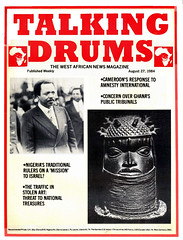Ghana's public tribunals: Do they offer fair trial?
Chairman Rawlings has also called for the judgement delivered by the Public Tribunal in respect of the case to enable the PNDC to study and determine appropriate measures to be taken.
The man, Nii Amoo-Addy was tried by the tribunal on a charge of murder.
Flt-Lt. Rawlings described the verdict as absurd and an insult to the intelligence of the public. He also noted that 'some of the tribunals are beginning to take on the characteristics of some of the traditional courts.'
Talking Drums is less concerned about the merits or otherwise of the tribunal's verdict. What is noteworthy here is Flt-Lt. Rawlings penchant for creating a monster which he later turns round to condemn in a bid to present himself as the only righteous person who is constantly fighting for the interests of the people.
On 5 January 1982, within a week of his installation as Head of State for the second time, Flight-Lieutenant Rawlings made a speech to the nation in which he revealed that the government intended to establish a Public Tribunal in which, "the dispensation of justice itself will be democratized." Flight-Lieutenant Rawlings explained that such a tribunal was necessary to prevent the courts being fettered by "technical rules which, in the past, have perverted the course of justice and enabled criminals to go free."
In ordering the re-arrest of Nii Amoo-Addy, the latest manifestation of the government's control over the tribunals, Flt-Lt. Rawlings characteristically tried to arouse the sentiments of his audience when he said that public tribunals were established to represent the conscience of the people, not to insult them in this way."
His action however confirms the view held by many, including Amnesty International, that the tribunals do not conform with internationally recognised standards of justice and that they do not represent a fair trial of people who appear before them.
On October 26, 1983, Amnesty International sent a memorandum on the Public Tribunals to Flt-Lt. Rawlings government following a mission to Ghana in August 1983 to observe the tribunals and collect information with respect to their functioning.
In its memorandum, Amnesty International made 10 specific recom- mendations which it called upon the government of Ghana to implement as steps towards bringing the structure and procedures of the Public Tribunals into conformity with internationally recognized standards of justice
These included the provision of a right of appeal, the clarification of other procedures, and steps relating to the competence and independence of tribunal members, the legal representation of defendants, and the burden and standard of proof. At the same time as Amnesty International sent its memorandum on the Public Tribunals to the government of Ghana, the organization requested an opportunity to meet appropriate officials of members of the govern- ment to discuss its concerns. How- ever, by June 1984 no reply had been received either to the memorandum or to the request for a meeting.
In December 1983, the Ghana government announced that they had revised the procedures of the Public Tribunals, and that among the amendments which had been in prep- aration since July 1983 was an appeals procedure. However, by the time Amnesty International issued its report last month it appeared that no court empowered to hear appeals had yet been established and people convicted by Public Tribunals were reported still to have no right of appeal.
Consequently among prisoners in Ghana whose cases Amnesty Inter- national is investigating as possible prisoners of conscience are some who have been convicted by Public Tribunals. The organization considers that such prisoners have not had a fair trial.
